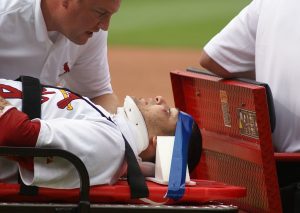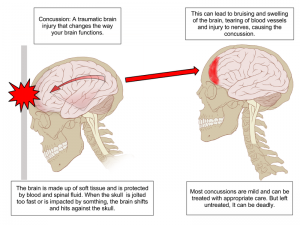October is finally upon us, therefore ’tis the season of hockey. We Canadians have this strange obsession with hockey. We enjoy the sight of a bone-crushing hit followed by a scuffle between the players involved or the entirety of the two teams. The adrenaline rush we get from watching players tackle each other is exhilarating. However, as we watch comfortably on our couches, the players under the helmet are at risk of obtaining a concussion, leading to neurological side-effects. The professional athletes we watch have many medical specialists tending to their injuries so that the repercussions may be minimized, but what about the young athletes playing in these contact sports?

MLB player, Yadier Molina, after suffering a mild concussion, courtesy of Wikimedia Commons
Dr. Neil Goldenberg and Dr. Patrick Mularoni of John Hopkins All Children’s Hospitial are teaming up with adolescent athletes to investigate methods to treat and diagnose concussion, providing safer conditions for young athletes. The researchers are given a $500.000 grant from All Children’s Hospital Foundation to perform this three-year study.
Firstly, what is a concussion? A concussion is a mild traumatic brain injury (TBI) that causes damage to the brain. Concussions are commonly generated after an impact to that head that quickly shakes the head and brain back and forth.

How a concussion is caused, courtesy of Wikimedia Commons
The Centers for Disease Control and Prevention estimated about 2.5 million people in the United States that visited hospitals for concussion diagnosis. Concussion symptoms vary depending on the severity of the injury; most of the symptoms subside relatively quickly. However, the long term effects require more studies to understand. A brief John Hopkins 2015 study of retired NFL players shows brain injury in the regions that regulate mood and verbal memory. Additionally, the players performed poorly on a memory test.
To prevent the potential long-term effects of concussions and protect young athletes, Dr. Goldenberg and Dr. Mularoni are determined to study changes in the brain functions of athletes in high school. Dr. George Jallo, Director of Brain Protection Sciences at John Hopkins, stated: “It’s very important for us to do a study in adolescents because that’s when their brain is developing and that’s when they’re going to have these head injuries.”
In my opinion, this study is a step in the right direction towards protecting youth in sports. As a former high school basketball player myself, I’ve experienced concussions due to errant elbows to the head. Being a stubborn person, I refused to stop and acted as if I was healthy. Although, I experienced minimal symptoms for a short period of time, it is unknown if the growth of my brain was affected at the time. Since I’ve suffered only one or two concussions it is unlikely to affect me in the long-term, but for the young athletes in hockey and football, contact is abundant, they might suffer through brain injuries that may change their livelihood forever.
-Nelson Yu
References:
Researchers and Athletes Team Up to Study Concussion. https://www.hopkinsallchildrens.org/ach-news/general-news/researchers-and-athletes-team-up-to-study-concussi (accessed Oct.16,2016)
Hedin, M. Johns Hopkins study of retired NFL players sheds light on concussion-related brain damage. http://hub.jhu.edu/2015/01/26/nfl-players-concussion-research/ (accessed Oct.16,2016)
Kivi, R. and Carey, E. Concussion. http://www.healthline.com/health/concussion#Overview1 (accessed Oct.16,2016)
